Episodes
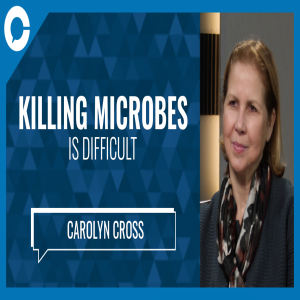
Tuesday Jun 02, 2020
Carolyn Cross: Killing Microbes is Hard
Tuesday Jun 02, 2020
Tuesday Jun 02, 2020
Ep 290 - Killing Microbes is Hard
Guest: Carolyn Cross
Antimicrobial resistance or drug resistance is one of the top five human health threats. That’s when viruses, bacteria and fungi can no longer be killed by the drugs that we have to deal with them. According to the World Health Organization, drug resistance will kill more people than cancer, diabetes and cholera combined.
When it comes to surgery, self infection of the surgical site is a problem. Your nose is home to many harmful germs (and even superbugs) and is a leading source of healthcare associated infections. In the U.S., up to 60% of hospitals remove these nasal germs with topical antibiotic presurgical nasal decolonization for major surgeries to reduce the likelihood of surgical site infections. Despite challenges that include low patient compliance, a five-day treatment regime and increasing antibiotic resistance, numerous randomized control trials indicate a 40% to 60% drop in these hospital acquired infections. For this reason, the World Health Organization recommends this pre-surgical treatment for ortho, spine and cardiac surgeries.
In Canada, only Vancouver Coastal Health requires universal presurgical nasal decolonization for all its major surgeries involving Ondine's Photodisinfection technology, a six-minute painless procedure. The infection reduction results have been significant over the past 9 years, since this health authority has implemented this first-of-a-kind technology. The addition of eliminating nasal pathogens with Ondine's Photodisinfection just minutes before major surgeries has contributed to the 80% reduction in serious infections. To date, more than 1,000 patients have been spared from these post surgical infections, saving millions of dollars annually. Ondine and Vancouver Coastal Health are now exploring if this same nasal decolonization treatment can be used to help prevent or treat COVID-19.
We invited Carolyn Cross of Ondine Biomedical to join us for a Conversation That Matters about the laser treatment her company has been developing to reduce surgical site infection rates.
Conversations That Matter is a partner program for the Morris J Wosk Center for Dialogue at Simon Fraser University. The production of this program is made possible thanks to the support of the following and viewers like you.
Please become a Patreon subscriber and support the production of this program, with a $1 pledge https://goo.gl/ypXyDs
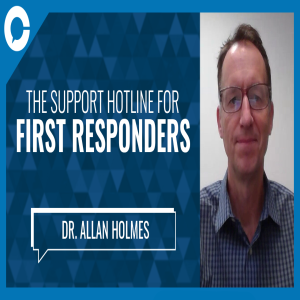
Sunday May 24, 2020
Hotline for First Responders (w/ Dr Allan Holmes)
Sunday May 24, 2020
Sunday May 24, 2020
Ep 289 - Hotline for First Responders
Guest: Dr Allan Holmes
First Responders are the people rushing into a crisis when the rest of us are rushing away. They are there when criminals break the law, when a building is on fire, when someone has been hurt or is extremely ill or someone has fallen ill due to a pandemic.
COVID 19 not only compromises health and takes lives, it also adds emotional and psychological stress to the women and men who respond to emergencies and crimes. Dr Allan Holmes has been working with first responders for decades providing them with training and strategies designed to improve their workplace and their work. Working with Fire, Police and Ambulance, he and the team at Iridia Medical have now set up a support hotline for First Responders looking for help in addressing the many questions they face regarding their well-being, that of their families and their colleagues. The hotline is via email, if you are a first responder and you have questions about your health and what you should do, the email address is Covid 19 support @ iridia medical .com
We invited Dr Allan Holmes of Iridia Medical to join us for a Conversation That Matters about the questions First Responders have about COVID 19 and how to determine when they should or shouldn’t go to work.
Conversations That Matter is a partner program for the Morris J Wosk Center for Dialogue at Simon Fraser University. The production of this program is made possible thanks to the support of the following and viewers like you.
Please become a Patreon subscriber and support the production of this program, with a $1 pledge https://goo.gl/ypXyDs

Thursday Apr 30, 2020
Your Pharmacist and C-19 (w/ Annette Robinson - Derek Desrosiers)
Thursday Apr 30, 2020
Thursday Apr 30, 2020
Ep 288 - Your Pharmacist and Covid19
Guest: Annette Robinson - Derek Desrosiers
|
Are pharmacists an underutilized health care resource in the fight against the Coronavirus? “Pharmacists are the most accessible health care professionals in BC,” says Annette Robinson, the Vice-President of the Pharmacy Association. “One reason pharmacists may be overlooked is due to a perception that they are merely prescription fillers.” Past BCPhA President Derek Desrosiers says, “Pharmacists are the drug specialists for sure, but the scope of practice for them has expanded over the years. Past health care crises forced the healthcare system to empower and enlist pharmacists to not only provide flu shots, but fill emergency prescriptions and manage adaptations.” What it adds up to is an additional health care provider who is available seven days a week, from early in the morning to late at night. We invited Annette Robinson and Derek Desrosiers to join us for a Conversation That Matter about a health care resource you may have overlooked. Conversations That Matter is a partner program for the Morris J Wosk Center for Dialogue at Simon Fraser University. The production of this program is made possible thanks to the support of the following and viewers like you. Please become a Patreon subscriber and support the production of this program, with a $1 pledge https://goo.gl/ypXyDs
|
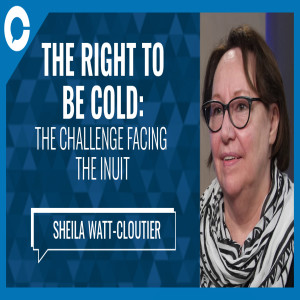
Wednesday Apr 29, 2020
The Right to be Cold - Sheila Watt-Cloutier
Wednesday Apr 29, 2020
Wednesday Apr 29, 2020
Ep 287 - The Right to Be Cold
Guest: Sheila Watt-Cloutier
|
On February 18th, SFU’s Morris J. Wosk Centre for Dialogue presented Sheila Watt-Cloutier with the Jack P. Blaney Award for Dialogue in recognition of her outstanding global leadership using dialogue in her work as an advocate for indigenous, environmental and cultural rights. Shauna Sylvester, Executive Director of the Centre says, “Sheila’s quiet determination has moved thousands – from global leaders to young climate advocates. She is an educator, dialogue innovator and elder who has helped us understand the experiences of the Arctic and learn about what this means for our shared future.” Watt-Cloutier previously held the role Canadian President of the Inuit Circumpolar Council (ICC), later to become the International Chair where she worked extensively to open space for dialogue that welcomes and invites the voices of indigenous peoples. Watt-Cloutier’s dialogue approach brings in indigenous storytelling as an empathy-driven connector between the minds and hearts of those she works with. Watt-Cloutier is author of the memoir, The Right to Be Cold, a chronicle of Canada’s North detailing the devastating impact of climate change on Inuit communities. We invited Sheila Watt-Cloutier to join us for a Conversation That Matters about the changes she has witnessed in the arctic.
Conversations That Matter is a partner program for the Morris J Wosk Center for Dialogue at Simon Fraser University. The production of this program is made possible thanks to the support of the following and viewers like you. Please become a Patreon subscriber and support the production of this program, with a $1 pledge https://goo.gl/ypXyDs
|
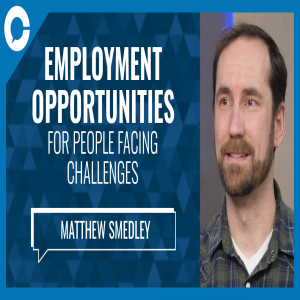
Thursday Apr 23, 2020
Mission Possible - Matthew Smedley
Thursday Apr 23, 2020
Thursday Apr 23, 2020
Ep 286 - Mission Possible
Guest: Matthew Smedley
Do companies have a responsibility to provide employment for the disenfranchised? Matthew Smedley says, “Yes, they do and doing so is good business!” He goes on to say, “Society, not the economy, is the real marketplace. And smart companies realize that looking after people – all people, including those who have been marginalized – builds better societies and stronger economies.”
Smedley also says, “People who are currently outside of the workforce are there for a host of reasons that include seen and unseen diversabilities. Many are eager to work and they represent an untapped talent pool.” Reemployment for many after extended absences from the rigors of work, he acknowledges, is challenging.
Mission Possible is a community based organization that, since 1992, has been providing people who have been unemployed with the skills needed to regain employment. The other side of the equation are employers who frequently are reluctant to create opportunities for people who need flexible work environments. Mission Possible is there for them as well.
We invited Matthew Smedley to join us for a Conversation That Matters about why hiring people with challenging lives benefits them, the companies they work for, and the community.
Conversations That Matter is a partner program for the Morris J Wosk Center for Dialogue at Simon Fraser University. The production of this program is made possible thanks to the support of the following and viewers like you.
Please become a Patreon subscriber and support the production of this program, with a $1 pledge https://goo.gl/ypXyDs

Wednesday Apr 22, 2020
Thank you Canada - A Syrian Refugee's Story - Nour Suliman
Wednesday Apr 22, 2020
Wednesday Apr 22, 2020
Ep 285 Thank you Canada - A Syrian Refugee’s story
Guests: Nour Suliman
Imagine, if you can, that for three of your 14 or 15 years of life you have been on the move in your homeland – staying one step ahead of the guns, the bullets and the bombs that are devastating you, your family and your community. You and 16 of your family squeeze into a car so that your grandmother, your uncle, your mother and father, along with your siblings and your cousins can wake up one more day.
Finally, you arrive at what you hope will be a safe house. You’re there for a matter of hours and your father says, “We have to move.” By now, his sense of survival is so finely tuned that he is aware of pending danger. You are exhausted. You were hoping for at least one night of sleep but your father insists, “Everyone get back in the car!”
You do as you are told. All 17 of you drive through the night, hoping to get to the Jordanian border – a border that is officially closed to refugees. Your father and uncle pay a guy with no name, a guy you don’t know who says he can get you all to the border but only in the dead of night. As you walk through harsh terrain, with no light, no water and no options, you learn the house you hoped to be sleeping in last night was bombed and destroyed. The house had been targeted because you and your family were there.
The nightmare continues as you enter Jordan and are accepted into a refugee camp. The water is putrid, the air is thick with aromas that make you gag. And through all of it, you hope that one day you will escape the nightmare of your life. You pray for a miracle.
We invited Nour Suliman to join us for a Conversation That Matters about the journey she and her family endured and the blessed miracle of Canada’s welcome.
Conversations That Matter is a partner program for the Morris J Wosk Center for Dialogue at Simon Fraser University. The production of this program is made possible thanks to the support of the following and viewers like you.
Please become a Patreon subscriber and support the production of this program, with a $1 pledge https://goo.gl/ypXyDs

Wednesday Apr 22, 2020
Dr David Smith - Your Brain on CO2
Wednesday Apr 22, 2020
Wednesday Apr 22, 2020
Ep 284 CO2 and your brain
Guests: Dr David Smith
A woodpecker slams its head into a hard object about 80 million times in its lifetime and doesn’t suffer from traumatic brain injury. Why? That was the question that was posed at a DARPA (or Defense Advanced Research Projects Agency) event a number of years ago. Those in attendance laughed at the question. Well, everyone but Dr David Smith, an internist who started to look into why woodpeckers can endure repeated jarring of their skulls and brains.
He learned the mechanisms in their skull, shoulders and the way in which the woodpecker’s tongue is attached to the skull and attaches to the Omo-Hyoid plays an important role in reducing TBIs. It appears their physical makeup and the interaction between them combines to trap blood and cranial fluid inside the skull preventing or reducing brain slosh.
Smith wondered if the same could be true for people, so he ran experiments on humans that demonstrate that pinching the Omo-Hyoid pinches the jugular and increases the volume of fluid in our skull, preventing brain slosh. That was part one of the non-traumatic equation. Part two involves CO2, a gas that Dr Smith says is vitally important in preventing and healing traumatic brain injury.
Smith says, “CO2 is my favorite gas!” He once again turned to the woodpecker which lives inside a small cavity in a tree where CO2 levels are about 5%. His research led him to study other animals that ram their heads into objects (and one another), like giraffes and bighorn sheep. Once again, their exposure to CO2 levels was high – some by where they live and others by CO2 manipulation.
We invited Dr Smith to join us for a Conversation That Matters about his research in reducing and healing traumatic brain injury.
Conversations That Matter is a partner program for the Morris J Wosk Center for Dialogue at Simon Fraser University. The production of this program is made possible thanks to the support of the following and viewers like you.
Please become a Patreon subscriber and support the production of this program, with a $1 pledge https://goo.gl/ypXyDs
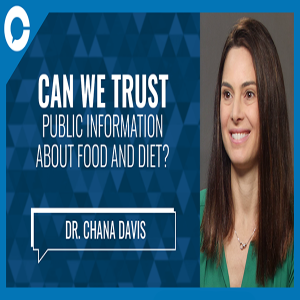
Tuesday Feb 25, 2020
Dr Chana Davis: Can we Trust Public Information about Food and Diet?
Tuesday Feb 25, 2020
Tuesday Feb 25, 2020
Coffee is good for you. No wait, it’s bad for you. Red wine? Well yes, it’s good for you. No, it’s not! Yes it is! Everywhere you look, there is a new study, a new opinion and a new fad about health – so many of them that it is extremely difficult to know which study or person you can trust.
Dr Chana Davis says, “You need to be very careful about whom you trust. Check the source, check the funder and determine if the research is peer reviewed.” Davis goes on to suggest that you double-check the findings: “Who else agrees? Does the WHO agree? What about the Canada Food Guide? And what does Pubmed.gov have to say?”
It’s easy to get swept up in the hype around diets. Your aunt, your uncle, and your mother’s best friend may all have lost weight on a low carb or high protein diet. Davis says, “While that may be true, you don’t know why. It may have been strict adherence to the plan. It could have been their particular metabolic make up.” In other words, anecdotal evidence isn’t enough to make an informed decision about a diet.
We invited Dr Davis to join us for a Conversation That Matters about where to find trustworthy information – one place for sure is on her new video podcast show Get Real Health on YouTube.
Dr Davis also suggests you check in with these organizations. Disease organizations (like Diabetes Canada, Diabetes UK, Heart & Stroke Foundation) Clinical care organizations (e.g. Mayo Clinic, Harvard Health) Public health organizations (e.g The World Health Organization, UK National Health Services) Dr Chana Davis obtained her PhD in genetics from Stanford University, and spent the first decade of her career in cancer research and personalized medicine (https://www.gene.com / https://www.genomebc.ca / https://www.canaryfoundation.org ).
In 2018, she founded Fueled by Science as a platform to help others get science-based answers to questions about diet and health. Check it out at https://fueledbyscience.com or search @fueledbyscience on Instagram, Facebook, and Twitter. ---
Simon Fraser University’s Centre for Dialogue presents Conversations That Matter. Join veteran broadcaster Stuart McNish each week for an important and engaging Conversation about the issues shaping our future. Please become a Patreon subscriber and support the production of this program, with a $1 pledge https://goo.gl/ypXyDs This show is produced by Oh Boy Productions, video production, podcast and vidcast specialists located in Vancouver. To find out more, go to http://www.ohboy.ca

Tuesday Feb 25, 2020
Areej Siddiqui - Love Avoidance
Tuesday Feb 25, 2020
Tuesday Feb 25, 2020
Ep 282 Love Avoidance
Guests: Areej Siddiqui
“She loves me, she loves me not, he loves me, he loves me not” is a game played by someone while plucking petals off of a flower. The petal supposedly represents the truth between the object of their affection loving them or not.
On Valentine’s Day, it’s not unusual to want to know you are loved and that you do love. However, as family and couples therapist Areej Siddiqui says, “Love is not always embraced by everyone. In fact, there are people who are love avoidant.” In other words, they choose to remain single.
The factors are complex but are linked to the primary caregiver early in life. Siddiqui says, “There may have been a negative relationship; there may have been a smothering relationship; there may have been an emotionally vacant relationship.” All are factors that could lead a child to be reluctant, suspicious or afraid of intimacy.
We invited Areej Siddiqui to join us for a Conversation That Matters about love, our need to connect and how to get past avoidance.
Conversations That Matter is a partner program for the Morris J Wosk Center for Dialogue at Simon Fraser University. The production of this program is made possible thanks to the support of the following and viewers like you.
Please become a Patreon subscriber and support the production of this program, with a $1 pledge https://goo.gl/ypXyDs
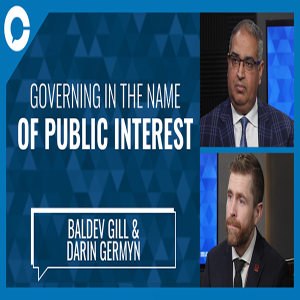
Tuesday Feb 25, 2020
Governing in the Name of Public Interest
Tuesday Feb 25, 2020
Tuesday Feb 25, 2020
Ep 281 Governing in the Name of Public Interest
Guests: Baldev Gill - Darin Germyn
In his series “Better Boards for Better Communities,” Ken Haycock points out that not-for-profit boards of directors play a foundational role in the communities they serve. Boards, he says, “help to define the strategic direction and purpose of the organizations they oversee.”
Recent changes in governance standards require almost the same degree of accountability for nonprofit boards as businesses, so it makes sense for nonprofit boards to be diverse and to take their responsibilities just as seriously.
It’s an important process and one we rarely get to see at work. The Fraser Valley Real Estate Board’s President, Darin Germyn, recently suggested a Conversation That Matters about some of the challenges his Board faces in changing its by-laws saying, “We are willing to spell out the challenges for all to consider”.
CEO Baldev Gill said, “We’re willing to be transparent and share the process of bringing our bylaws into line with current protocols.”
In this episode of Conversations That Matter, the CEO and Board President of the FVRB join me to dig into the process of changing a bylaw and why it matters to members and, most importantly, the public at large.
Conversations That Matter is a partner program for the Morris J Wosk Center for Dialogue at Simon Fraser University. The production of this program is made possible thanks to the support of the following and viewers like you.
Please become a Patreon subscriber and support the production of this program, with a $1 pledge https://goo.gl/ypXyDs

